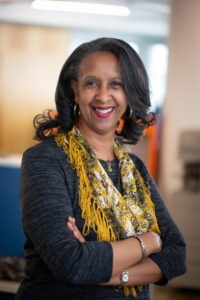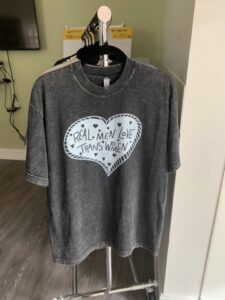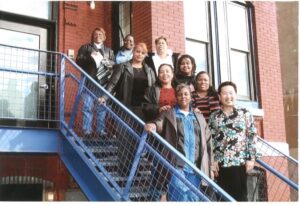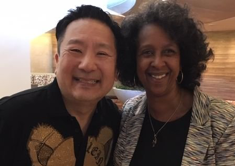 Kim Ferrell is NMAC’s Deputy Director for Operations. She’s been with me and NMAC for over 16 years, longer than any boyfriend. She is the heart and soul of the agency. Kim plans on retiring next year, so to say thank you to her and all the other sheroes, 2023 is NMAC’s love letter to Black women (cis & trans). Like we leaned into Puerto Rico last year, the 2023 United States Conference on HIV/AIDS will celebrate and honor Black women. They are the backbone of NMAC and our work. USCHA is September 6-9 in Washington, DC at the Marriot Marquis. A special Black Women’s Summit will proceed the gathering. The Opening Plenary will tell their stories and celebrate their magic. Their experiences will be highlighted in workshops, institutes, posters, and special events.
Kim Ferrell is NMAC’s Deputy Director for Operations. She’s been with me and NMAC for over 16 years, longer than any boyfriend. She is the heart and soul of the agency. Kim plans on retiring next year, so to say thank you to her and all the other sheroes, 2023 is NMAC’s love letter to Black women (cis & trans). Like we leaned into Puerto Rico last year, the 2023 United States Conference on HIV/AIDS will celebrate and honor Black women. They are the backbone of NMAC and our work. USCHA is September 6-9 in Washington, DC at the Marriot Marquis. A special Black Women’s Summit will proceed the gathering. The Opening Plenary will tell their stories and celebrate their magic. Their experiences will be highlighted in workshops, institutes, posters, and special events.
NMAC owes so much to so many. We will celebrate Black Women across our movements, from activists to women living with HIV, national advocates, community voices, federal leaders, heath department staff, healthcare workers, and researchers. There are also many important women focused organizations. NMAC will tell multiple stories.
Black women play key roles at NMAC, starting with our founders, Rashida Abdul-Khabeer (formerly Hassen), Sandra McDonald, and Marie St. Cyr to our staff Tara Barnes-Darby (26 years @ NMAC), Alison McKeithen (15 years @ NMAC), Shantá Gray, Diane Ferguson, Asia Moore, Gabriella Spencer, and Lauren Miller to our long-term board members Valerie Rochester, Evelyn Ullah, and Monica Johnson. Black women have been instrumental to NMAC and our movement. Unfortunately, we’ve also lost many warriors like Natalie Cole (NMAC’s first major donor), Linda Jackson (OAR), Pandora Singleton (Project Azuka), Barbara Joseph (NBWHAN), Janet Cleveland (CDC), Dr. Dawn Smith (CDC), Juanita Williams, Dr. Janet Mitchell (Harlem Hospital), and the heart-breaking list goes on. Who are the women you want NMAC to remember, honor, and celebrate?
 As part of our commitment, NMAC will also work to support and hire Black women owned small businesses. The agency challenges our sponsors, donors, and government partners to use these businesses and to hire Black women, especially Black transwomen. We must put our money where are principles live. Recently I had the opportunity to visit Queen Victoria Ortega at the Connie Norman Transgender Empowerment Center. They are an incubator for small trans owned businesses. I visited a t-shirt company they are starting. Our movement buys so many t-shirts, so please support the vendors who come from the communities highly impacted by HIV. It’s not always about getting the cheapest t-shirt. You may pay a little more, but you are also building community.
As part of our commitment, NMAC will also work to support and hire Black women owned small businesses. The agency challenges our sponsors, donors, and government partners to use these businesses and to hire Black women, especially Black transwomen. We must put our money where are principles live. Recently I had the opportunity to visit Queen Victoria Ortega at the Connie Norman Transgender Empowerment Center. They are an incubator for small trans owned businesses. I visited a t-shirt company they are starting. Our movement buys so many t-shirts, so please support the vendors who come from the communities highly impacted by HIV. It’s not always about getting the cheapest t-shirt. You may pay a little more, but you are also building community.
We need to invest in the communities highly impacted by HIV. The world is not fair and, without extra support, our work will miss too many of the folks we need to reach. As we honor Black women, it is also important to acknowledge that HIV PrEP outreach misses too many. We can and must do better if we are to hit the 2025 goals for ending the HIV epidemic by 2030. We can’t end HIV without reaching Black women.
There will be a special scholarship pool for Black women for USCHA and the 2023 Biomedical HIV Prevention Summit in Las Vegas on April 11-12. Our goal is to double the number of scholarships to accommodate all the extra scholarships for Black women. Information about these scholarships will go out in February when the USCHA website goes live. Summit scholarships are open to apply.
Growing Leadership Opportunities for Women (GLOW) @ NMAC
 Linda Scruggs started GLOW (Growing Leadership Opportunities for Women) at NMAC. The program is now led by Gabriella Spencer (gspencer@nmac.org) As a young Black cisgender woman, she represents the future. GLOW aims to build robust, sustainable leadership among women of color living with or at risk of HIV. GLOW is grounded in “social entrepreneurship,” where highly innovative individuals and groups are supported to bring their ideas to members of their own community. GLOW is designed for cis and trans women of color.
Linda Scruggs started GLOW (Growing Leadership Opportunities for Women) at NMAC. The program is now led by Gabriella Spencer (gspencer@nmac.org) As a young Black cisgender woman, she represents the future. GLOW aims to build robust, sustainable leadership among women of color living with or at risk of HIV. GLOW is grounded in “social entrepreneurship,” where highly innovative individuals and groups are supported to bring their ideas to members of their own community. GLOW is designed for cis and trans women of color.
NMAC aims to recruit 20 women from five different regions. Although the project is designed for women of color generally, in 2023 GLOW will prioritize Black women with Latinx women to be the focus in 2024. Participants can apply for mini-grants ($500) to support local GLOW trainings. Up to 12 GLOW participants will be selected as mini-grant recipients to plan and implement their trainings. GLOW will convene twice annually in wellness summits. These summits will review experiences to implement GLOW mini-grants and build a strong, sustained, national network of women of color for HIV advocacy, leadership development, and social support.
 I am grateful to all the Black women mentors who guided and shaped me as a leader. They gave me courage and taught me to never let anyone take my light. To Kim, I will miss you like you don’t know. I’m glad we have a year to celebrate you and other Black women sheroes. As I’ve learned from doing this work, some people are in your life for a moment and others a lifetime. Celebrate and thank them because time passes much too quickly.
I am grateful to all the Black women mentors who guided and shaped me as a leader. They gave me courage and taught me to never let anyone take my light. To Kim, I will miss you like you don’t know. I’m glad we have a year to celebrate you and other Black women sheroes. As I’ve learned from doing this work, some people are in your life for a moment and others a lifetime. Celebrate and thank them because time passes much too quickly.
Yours in the Struggle,
Paul Kawata w/Kim

